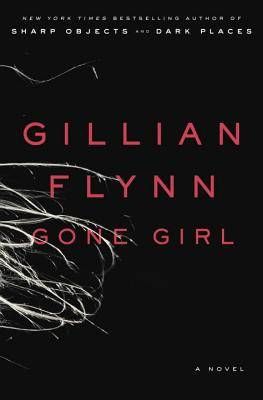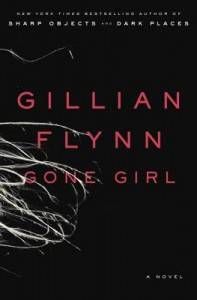
Front-to-Backlist: GONE GIRL by Gillian Flynn
Editors’ Note: We thought long and hard about how to provide a kind of review coverage that would not be too much (no one wants to read endless book reviews anymore) but would also contribute to arts coverage in a meaningful way. Our solution is “Front-to-Backlist,” a new feature in which Executive Editor Bethanne Patrick will review a new release (in publishing parlance, something from the “frontlist”), and Editor-in-Chief Jeff O’Neal will respond with a review of a previously published, or backlist title, which might be fairly current, or might be a classic, or perhaps even a forgotten masterpiece… We’re choosing the pairs of books together with the idea that not only will these reviews add to the conversation–but will also be a conversation of their own. We hope you’ll enjoy this first duo, which matches Gillian Flynn’s much-buzzed-about and just-released Gone Girl with Hannah Pittard’s 2011 The Fates Will Find Their Way.
____________________________
You may not expect to begin a review of a hot new thriller with discussion of a memoir, but there it is. It was in discussing Cheryl Strayed’s wildly (heh) popular new book (and first title for the resurrected Oprah’s Book Club) Wild that I realized what has been bothering me about all of the buzz surrounding Gillian Flynn’s Gone Girl. Why, I wondered to an author friend, do women read Strayed’s account of her dangerous, ill-conceived, and often horrifically distressing hike (duct-tape sandals, anyone?) and take away a sort of distaff cry of “Freeeeeeeeeedom!” instead of “Don’t try this at home. Or really, at all”?
Wait, wait, don’t tell me. No, really–don’t tell me. Of course I know why: It’s because Strayed lived to tell the tale. Even though there were times when she might have died from hypothermia, starved to death due to laughably limited finances and poor management thereof, or been abducted/raped/possibly murdered, none of that happened. She emerged, a sort of Artemis intacta, and now lives what appears to be a contented, well-rounded life as wife, mother, and successful author/journalist (in case you missed it, Strayed was revealed to be the long-anonymous and also wildly popular “Dear Sugar” columnist for The Rumpus earlier this year).
But instead of thinking “There but for the grace of the goddess” (or whatever catchphrase you prefer) and returning to their own contented, well-rounded lives, so many woman think “I should take a hike and learn about my inner self and needs and longings,” forgetting that perhaps those needs and longings could be answered not by imitating another woman’s epiphany, but by seeking their own.
 A brief recap of the twist-y, turn-y plot of Gone Girl: Nick and Amy Dunne once had it all as aspiring writers in New York City, but when his mother’s illness propels the couple back to Nick’s Missouri hometown, things fall apart–and we quickly learn that there may never have been a center. Just before the Dunnes’ fifth anniversary, Amy disappears and the story is told in chapters that alternate between Nick’s voice as he copes with loss and suspicion and Amy’s journal entries from the preceding seven years.
A brief recap of the twist-y, turn-y plot of Gone Girl: Nick and Amy Dunne once had it all as aspiring writers in New York City, but when his mother’s illness propels the couple back to Nick’s Missouri hometown, things fall apart–and we quickly learn that there may never have been a center. Just before the Dunnes’ fifth anniversary, Amy disappears and the story is told in chapters that alternate between Nick’s voice as he copes with loss and suspicion and Amy’s journal entries from the preceding seven years.
Amy Dunne is not only a perfect avatar of discontent: Like Strayed, an unreliable narrator. Strayed knows she cannot be trusted with her own life, let alone with telling it, while she’s on the Pacific Coast Trail, which may be one of the reasons that she peppers her recollections with conclusions she’s made in the succeeding decades. Flynn’s character of Amy, though, believes she’s got it all under control. It scares me to remember that as readers we are so often experiencing emotions vicariously–Strayed’s triumphs, Amy Dunne’s machinations–and forgetting that we are being manipulated. (Side note: I loved Wild, and I think Strayed is rather amazing, but I still also realize that any text is a construct.)
Need I even say nothing is as it seems? If you’ve read Flynn’s previous two novels, Sharp Objects and Dark Places, you already know that even small parts of familiar things can be macabre. Between the elaborate anniversary scavenger hunt Amy sends Nick on down to the ties that bind (more painful than any 50 Shades of Gray silk ties), in this book it felt as if Flynn were making the reader complicit in the unraveling of one of those crepe-paper “surprise balls” that are supposed to contain small treasures en route to a bigger gift. In this case, the center isn’t hollow anymore, but filled with horror. Nick writes: “We are all working from the same dog-eared script. It’s a very difficult era in which to be a person, just a real, actual person.”
In contrast, the Strayed of Wild isn’t working from anyone’s script, and is very much a real person. However, the fictional Amy Dunne makes some very poor personal choices, just like Strayed–and for me, these were the jarring notes in Flynn’s elegantly written and superbly plotted novel. Amy Dunne is a control freak extraordinaire, someone who would never wind up with a handful of change at a trail station or without proper footwear, yet she fails to recognize the grifters in her midst at one point with the same naïveté that affects Strayed from time to time on her travels.
I didn’t mean to turn this review into a mini-version of what “Front-to-Backlist” is meant to be; it just happened. What I realized after considering Flynn’s book alongside Strayed’s is that good girls don’t always make good choices. I knew that. What surprised me is that bad girls don’t always make good choices, either. A lifelong good girl, I thought that bad girls always finished first, licking their fingers and smiling like the proverbial cat. Flynn’s finish is almost Hammurabic in execution and Sphinx-like in tone, a truly wild ride that any reader can take more safely than a hike.
For more coverage of Gone Girl, check out our Review GPA post.








